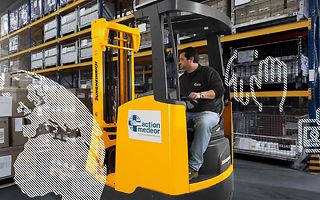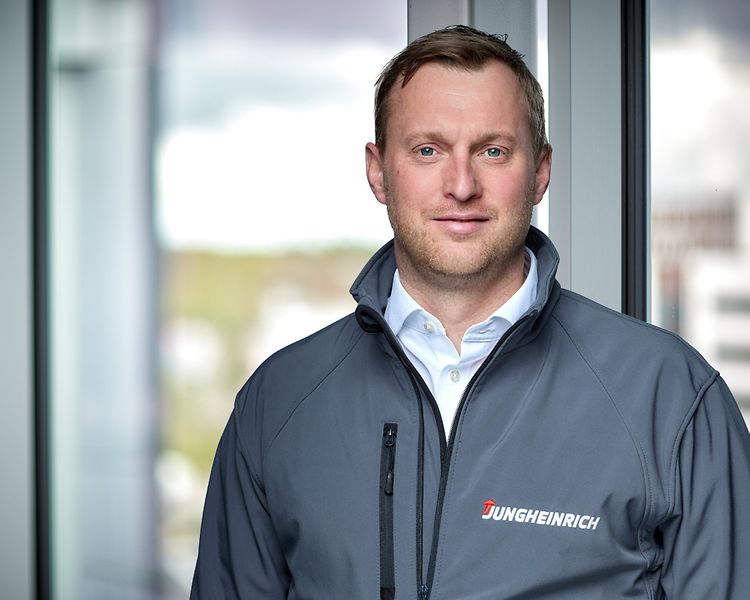- Incoming orders Q1–Q3: 3,873 million euros (+8 per cent)
- Revenue Q1–Q3: 4,020 million euros (+18 per cent)
- EBIT Q1–Q3: 338.8 million euros (+27 per cent)
- EBIT ROS Q1–Q3: 8.4 per cent (previous year: 7.8 per cent)
- Forecast for 2023 remains unchanged
Hamburg – Jungheinrich AG recorded solid revenue and earnings performance in the first nine months of the 2023 financial year; however, weaker market demand was also noted over the course of the year. Jungheinrich’s incoming orders across all business fields amounted to 3,873 million euros from January to September 2023, 8 per cent higher than the previous year’s figure of 3,594 million euros. Orders for trucks in new business declined noticeably however in the third quarter. “Jungheinrich achieved new revenue and earnings records in the first three quarters. However, the economy slowed markedly over the course of the year, particularly in Europe and the USA. At the same time, geopolitical risks increased further. In light of these developments, we noticed a clear decline in truck orders in the third quarter. Cumulatively though, incoming orders remain above the previous year’s level,” comments Dr Lars Brzoska, Chairman of the Board of Management of Jungheinrich AG.
Orders on hand in new business totalled 1,587 million euros as of 30 September 2023. This figure is 169 million euros, or 10 per cent, less than in the previous year (1,756 million euros) and is on a par with the orders on hand as of 31 December 2022 (1,595 million euros). Developments in orders on hand are due in part to the further normalisation of supply chains, which led to a more efficient processing of existing orders.
Group revenue at Jungheinrich in the first nine months came to 4,020 million euros and was thus around 18 per cent higher than in the previous year (3,397 million euros). This growth was mainly driven by the new business. In addition to the positive growth in new trucks, the revenue of 136 million euros from Storage Solutions, which Jungheinrich acquired this year, also contributed to this performance. Of that amount, 67 million euros was generated in the third quarter of 2023.
Earnings before interest and income taxes (EBIT) rose by 72.9 million euros, or 27 per cent, to 338.8 million euros in the period from January to September 2023 (previous year: 265.9 million euros). EBIT ROS was also higher than in the same period of the previous year at 8.4 per cent (7.8 per cent). EBIT benefited from the implementation of measures to safeguard margins, which more than compensated for the increase in costs due to material price rises, tariff effects and personnel expansion, including through acquisitions. The contribution to operating earnings from the Storage Solutions Group from March to September 2023 included in this figure amounted to 21 million euros. At 314.6 million euros, EBT was up considerably by 34 per cent year-on-year (234.6 million euros). EBT return on sales amounted to 7.8 per cent (previous year: 6.9 per cent). Profit or loss amounted to 231.3 million euros (previous year: 174.8 million euros). Earnings per preferred share were 2.28 euros (previous year: 1.72 euros).
As of 30 September 2023, the Jungheinrich Group’s net debt amounted to 360 million euros (31 December 2022: 75 million euros). This clear increase of 285 million euros from the end of 2022 was primarily due to negative free cash flow in the first half of 2023 as this figure was impacted by 307 million euros from the purchase price payments for the Storage Solutions Group. Free cash flow from January to September 2023 amounted to –98 million euros (previous year: –273 million euros). Disregarding the acquisition, Jungheinrich exhibits positive free cash flow.
The Jungheinrich Group’s workforce increased by 1,262 employees in a nine-month comparison to 20,845 (previous year: 19,583). Overall, a large part of the increase was attributable to the acquisition of the Storage Solutions Group and Magazino, the expansion of the nearshoring organisation and the start of production at the new plant in Czechia.
Forecast
Jungheinrich’s forecast for the current financial year first published on 24 April 2023 and confirmed in the interim report as of 30 June 2023 remains unchanged.
The Board of Management’s assumptions regarding the expected development of the company have not changed materially since the publication of the last report.
Jungheinrich expects incoming orders of between 5.0 billion euros and 5.4 billion euros for the whole of 2023 (2022: 4.8 billion euros). Group revenue is forecast to be within a range of 5.1 billion euros to 5.5 billion euros (2022: 4.8 billion euros). This range takes into account incoming orders of 0.3 billion euros and revenue of 0.2 billion euros from the Storage Solutions Group.
We estimate that EBIT will amount to between 400 million euros and 450 million euros in 2023 (2022: 386 million euros). This includes one-off transaction-related costs amounting to approximately 8 million euros resulting from the acquisition of the Storage Solutions Group and – after the final purchase price adjustment and completed purchase price allocation – negative effects amounting to 13 million euros. The EBIT range also takes into account around half of the variable, performance-related remuneration components for the management of the Storage Solutions Group amounting to 15 million euros, which was calculated according to the conditions set out as part of the transaction. The negative effects will be partially offset by the pro rata operating result of the Storage Solutions Group in the amount of 25 million euros to 30 million euros. EBIT ROS is expected to range between 7.8 per cent and 8.6 per cent (2022: 8.1 per cent). EBT is expected to reach 370 million euros to 420 million euros (2022: 347 million euros), corresponding to an EBT ROS of between 7.2 per cent and 8.0 per cent (2022: 7.3 per cent). We are anticipating ROCE between 15 per cent and 18 per cent (2022: 16.3 per cent).
Furthermore, Jungheinrich expects that free cash flow will see a marked improvement on the previous year (–239 million euros) but will still remain negative due to the acquisition of the Storage Solutions Group. The free cash flow forecast includes 307 million euros in accordance with the final purchase price adjustment agreed contractually with the close of the acquisition. A portion of the purchase price was used to repay bank liabilities and is therefore not considered part of the free cash flow. Disregarding the acquisition, Jungheinrich expects the operating business to generate a positive free cash flow.





